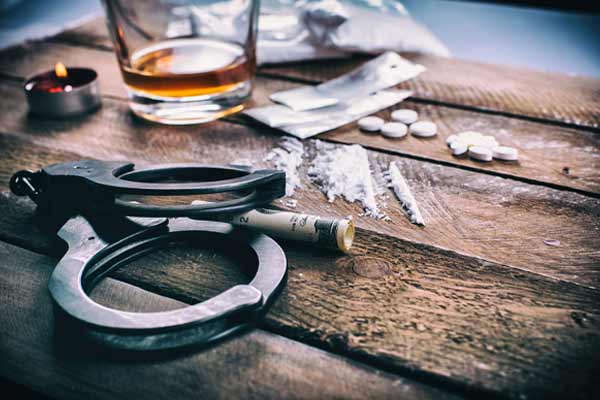Can You Legally Record Police Officers?
11/09/2025
If you’re dealing with drug charges, you may be wondering how best to defend yourself against them. Find a criminal defense attorney at Ktenas law. They’ll be able to tell you whether they think there’s any chance of reducing or dismissing your criminal charges.
Drug use has become an increasingly serious problem for Americans, so law enforcement officials are usually strict when dealing with offenders. If you are arrested on drug charges in Chicago, it may not be easy for you to beat the charges against you.
If you’re facing criminal drug charges, you’ll want an experienced Chicago drug attorney by your side to fight against your potential penalties. We know exactly what needs to be done for our client’s cases to go smoothly through the court system. At Ktenas Law, our lawyers are committed to fighting for you and your rights.
If you’ve been arrested and are worried about the consequences if you don’t fight back, contact an attorney right away. If you need a lawyer for drug charges, we are available to be able to help you through any legal issues that may arise during your time with our law firm.
If you’re hit with drug charges, you’ll face different penalties depending on which substances were involved. For instance, more dangerous, addictive drugs like cocaine often lead to harsher punishments than less harmful ones. You might be hearing terms such as “Schedule III drug” without understanding how that applies to your situation.

In short, the closer the schedule gets to 1, the stronger, more addictive, and more dangerous the substance becomes. Schedule 1 substances are usually considered to be the most harmful because they’re viewed as dangerous and used for recreational purposes, making them more likely to be abused. According to the law, these drugs also lack any known medical use, which makes them even more dangerous. Heroin, methamphetamine, cocaine, ecstasy, and even marijuana are all classified as schedule 1 drugs.
Schedule V drugs are considered the least dangerous, with low potential for abuse and known medical uses, but they still have the potential to cause harm. These substances are still capable of inflicting serious penalties on your future.
It’s essential to know the potential consequences when faced with drug possession or other drug charges. People often overlook just how severe a drug-related crime is considered by law enforcement officials.
A good Chicago drug attorney can explain exactly how serious even a misdemeanor offense can be. Don’t let yourself get into trouble if you’re facing criminal charges. Seek legal advice first, an experienced attorney may be able to help you avoid a criminal conviction.
If you’ve been charged with any type of crime, including drugs, then you may face serious consequences if convicted. Sadly, many people think that they won’t be able to fight back because it’s their word against an officer’s. Nevertheless, accepting the penalties may result in long term consequences that could prove hard to overcome.
Felony charges may result in at least one year in prison time. If you’re caught schedule I or II substances, the amount of time that you might end up serving in prison may be particularly long. Certain drug crimes may even be listed as Class X felonies, the highest classification in Illinois. These offenses include making methamphetamine or possessing controlled substances such as marijuana, cocaine, or heroin, with the intent to distribute them to someone else.

You can spend anywhere from 6 to 30 years in prison for Class X felony convictions. There may be some aggravating factors that would extend the length of time spent in prison.
On top of your prison sentence, you may have other penalties to face. You can find yourself facing up to $25,000 in fines if charged with a Class X felony. Even after you have served your prison time, you may still struggle to meet the financial penalties in felony offenses.
A misdemeanor conviction could result in jail time, fines, community service, probation, and more depending upon the circumstances surrounding the crime. Even a minor drug offense, such as an arrest for small amounts of marijuana, may not be easy for you to recover from.
For example, even if the most minor offense was committed, you could find yourself facing fines ranging up to $1,500 for a Class C misdemeanor conviction. Many people would find a fine of $1,500 to be a major setback, impacting you much they have to send on food, housing, and other bills. You could also see a maximum penalty of up to 30 days in jail, with probation after your release.
A 30 day jail sentence could easily make you lose your job, adding further stress to your financial situation and making it critical that you fight your charges. With this in mind, it is easy to see how even misdemeanor offenses can leave you struggling.
Unfortunately, the penalties don’t end when you’re released from prison. Your sentence and your criminal record won’t go away just after your conviction; they’ll continue to impact your quality of life for years to come.
If you’re applying for jobs right after having been released from prison, then you’ll need to explain why you were incarcerated before you get hired. And even if you avoided incarceration you will need to explain your criminal record. Many potential employers won’t consider hiring someone who has been convicted of a crime. It might be difficult for you to find a job in the field you’re trained in if companies turn you away due to your record.
You may have an issue finding adequate housing as well. If you are looking to rent an apartment or home, your criminal record may be found when the potential landlord runs a background check. Many landlords will deny you if they discover your criminal record, which could result in you struggling to find adequate housing.
Related: Chicago Expungement Lawyer
Depending on the circumstances surrounding an accusation of drug-related crimes, you may have a difficult time defending yourself in court. We’ll start by reviewing the facts of your situation before working to build an effective defense for your specific situation.
If you were pulled over by the police for speeding, they may have found drugs inside the vehicle. You may not have driven your own car at all, but rather someone else’s. If you can demonstrate that you were not likely to be aware of the presence of drugs in the car, you may be able to get your charges dropped.
In addition, the police officers might not actually have been acting lawfully at all. The search they conducted of your vehicle or home may not have been legal, which could lead to a dismissal of your case.

You’ll want to hire an attorney who has experience handling cases like yours before going to trial. If you’re thinking about representing yourself or relying on a public defender, you might find yourself without the support you need throughout your case.
Representing yourself means limiting your options when it comes to evidence and a strong defense against charges. It is unlikely that you have the expertise to effectively represent yourself in a trial. You might be able to get some good tips from websites like ours, but there’s always a risk that they could take bad advice and make your situation worse.
Public defenders may be a better option than self-representation, but may not provide the best defense for your case. Public defenders are chronically overworked, often with multiple clients at once, which can leave you without the attention that you need for your case. Because of this, you may want to seek out a private Chicago criminal defense lawyer who can devote their full attention to your case.
At Ktenas law we know that drug offenders can face criminal penalties that can leave them in financial ruin. We will fight to protect your constitutional rights and get you the best possible results for your case. Contact us today to schedule your free initial consultation.

